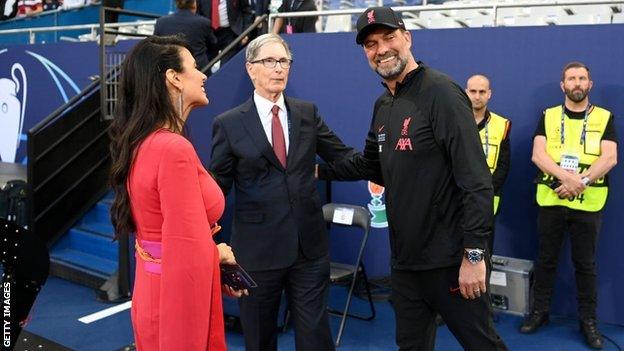Liverpool owners Fenway Sports Group 'would consider new shareholders'
- Published
- comments

Liverpool owner John Henry (second left) with manager Jurgen Klopp
Liverpool's owners say they "would consider new shareholders" following reports that the club is up for sale.
The Athletic reported, external that Fenway Sports Group (FSG), which bought Liverpool in 2010,, external is "inviting offers".
FSG said it "remains fully committed to the success of Liverpool, both on and off the pitch".
Liverpool, Premier League runners-up last season, are eighth in the table.
They have reached the last 16 of the Champions League, where they will face Real Madrid in a repeat of last year's final.
An FSG statement read: "There have been a number of recent changes of ownership and rumours of changes in ownership at Premier League clubs and inevitably we are asked regularly about Fenway Sports Group's ownership in Liverpool.
"FSG has frequently received expressions of interest from third parties seeking to become shareholders in Liverpool.
"FSG has said before that under the right terms and conditions we would consider new shareholders if it was in the best interests of Liverpool as a club."
Liverpool supporters' union, Spirit of Shankly, said it hoped fans would be consulted in any talks involving new owners of the club.
"We have seen reports today that FSG have put Liverpool FC up for sale," it said in a statement.
"Spirit of Shankly have written to LFC for clarification and will await a reply before making comment. We do, however, expect both the Supporters Board and SOS to be engaged in some part of the process so that supporters are front and centre of any sale and the first thoughts of prospective owners.
"We will keep you updated."
FSG bought Liverpool in a £300m deal under its old name New England Sports Ventures.
Basketball star LeBron James has been a part-owner of Liverpool since 2011 and has a 2% stake which cost him £4.7m.
He has since become a minor partner in FSG, which also owns baseball side Boston Red Sox.
In March 2021, RedBird Capital Partners, a private investment firm, bought a stake in FSG, external for about $735m (£533m).
Liverpool's principal owner John W Henry apologised to the fans in April 2021 after the club backed out of a proposed European Super League.
Liverpool signed striker Darwin Nunez for an initial £64m, attacking midfielder Fabio Carvalho for £5m and defender Calvin Ramsay for £4.2m this summer.
The departures from the club included Sadio Mane who left for Bayern Munich for at least £27.4m, while fellow forward Takumi Minamino joined Monaco for an initial £13m. Neco Williams moved to Nottingham Forest in a deal worth about £17m and fellow defender Ben Davies signed for Rangers for an initial £3m.
"From time to time I would be ready to risk a bit more but I don't decide that and that's fine," manager Jurgen Klopp said in August.
Analysis
Football finance expert Kieran Maguire on BBC Radio 5 Live
Fenway Sports Group have seen the amazing price Chelsea were sold for (£4.25bn) and also that they have got an additional rival in Newcastle United. Six into four in the Champions League doesn't go, while seven into four goes worse.
Newcastle's owners bought that club for the same price FSG paid for Liverpool - £300m. FSG could easily sell for 10 times that amount - if not more - if they are going to consider offers, and the Premier League remains an incredibly lucrative proposition to investors and ultra high-worth individuals.
The pound is weak at present, which makes that deal even more attractive, if those investors are coming from overseas.
Arsenal have gone five years now without being part of the Champions League and Liverpool's owners will have noted the loses Arsenal would have racked up over that time. They won't want it for their own business, because they have been very cautious about putting additional money in and they're probably thinking it's a good time to sell - or certainly see what the options are as far as the club is concerned.
It will probably mainly be American investors looking at Liverpool. The Chinese government has dissuaded its corporations from investing in football, so that's one area which has disappeared. I'm not sure there are many domestically that would realistically have close to £4bn to buy Liverpool.

Our coverage of Liverpool is bigger and better than ever before - here's everything you need to know to make sure you never miss a moment
